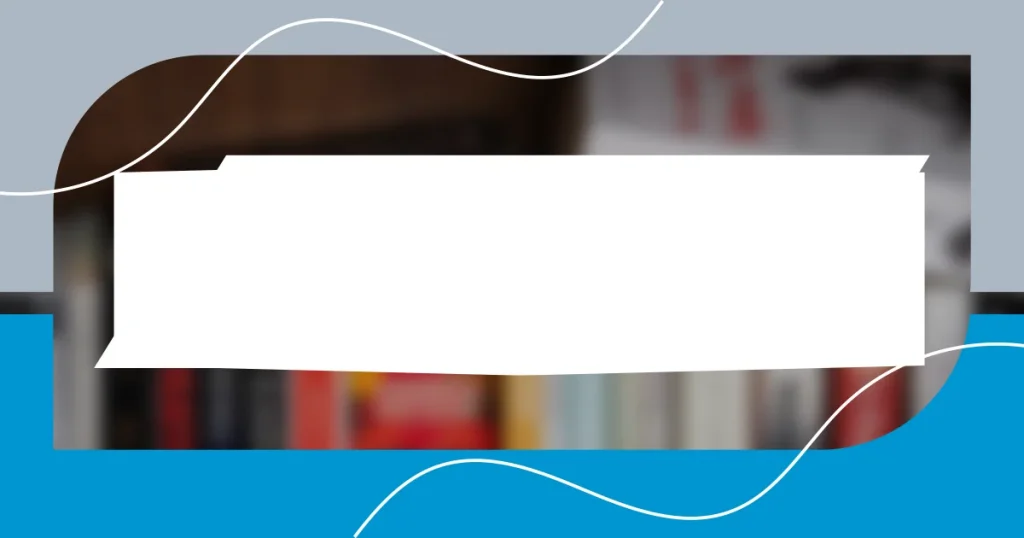Key takeaways:
- The literary awards landscape is influenced by both personal taste and current cultural trends, highlighting the importance of recognizing diverse voices and themes relevant to society.
- Understanding and meticulously following submission guidelines is crucial for success in literary awards, as it can significantly impact the chances of recognition.
- Engaging with feedback and learning from past winners can enhance a writer’s craft, fostering personal growth and a deeper connection to their narrative style.

Understanding Literary Awards Landscape
Navigating the literary awards landscape can feel like wandering through a maze. I remember attending a panel discussion where the judges spoke candidly about their criteria for selection—how personal taste often mingled with broader industry trends. It made me wonder: how much does the recognition of a book hinge on the current cultural zeitgeist rather than its literary merit?
As I explored various awards, I found that categories range from the prestigious to the niche, capturing diverse voices within literature. For instance, I once submitted a short story to a local competition that had a focus on underrepresented authors. That experience opened my eyes to how impactful these targeted awards can be, not just for personal growth, but for amplifying marginalized voices.
What struck me the most was the unpredictability of trends in literary awards. Some years, it seems like thrillers captivate everyone’s attention, while other times, literary fiction takes the spotlight. Reflecting on this ebb and flow reminds me of how my own reading tastes evolve—do we chase what’s on trend, or do we stick with what resonates deeply with us?

Identifying Key Trends in Awards
Identifying key trends in literary awards requires a keen eye and a willingness to adapt. I remember my first encounter with genre-specific awards; I was astonished by how they spotlighted works that might otherwise fly under the radar. This experience made it clear to me that recognizing the types of books that gain traction during certain years or among specific communities is crucial.
Moreover, examining the recent influx of awards focusing on climate fiction and social justice narratives has been truly fascinating. I’ve noticed writers increasingly reflecting the anxieties of our times, which influences judges’ selections. This shift not only captivates readers but also drives writers to explore themes that resonate with current societal issues, making the awards landscape feel more relevant than ever.
Delving into nomination patterns has also been enlightening. After some research, I realized that many award recipients share similar backgrounds, which often shape their storytelling. I remember comparing notes with fellow writers at a conference, and we discussed how the presence of diverse voices in the literary world can transform mainstream award accolades into platforms for broader representation. It was an illuminating moment that emphasized the importance of ensuring everyone’s stories are heard and celebrated.
| Trend Description | Example |
|---|---|
| Genre-Specific Awards | Focus on niche categories such as romance or speculative fiction |
| Current Social Issues | Recognition of works addressing climate change or social justice |
| Diversity Trends | Emergence of awards highlighting marginalized voices |

Researching Award Submission Guidelines
Researching submission guidelines is not just a formality; it’s a crucial component of my literary journey. I recall wrestling with the differing requirements for various awards—some wanted a synopsis and others insisted on a full manuscript upfront. It can feel overwhelming, but I’ve learned that diligence in understanding these specifics can set me apart from the competition.
Here are some key aspects to consider when delving into submission guidelines:
- Understanding Word Limits: Each award has unique word count requirements. My first submission suffered because I missed this detail, leading to disqualification.
- Formatting Specifications: Some awards specify particular formatting styles, like double-spacing or font types. I’ve had to reformat submissions countless times, but now I double-check these before sending anything out.
- Eligibility Criteria: Not all awards are open to everyone; some target specific demographics, like emerging authors or those living in certain regions. The discovery of an award tailored to debut authors felt like a turning point in my career.
- Submission Timing: Knowing the deadlines can make or break an application. I once scrambled just days before a cut-off, learning the hard way that early planning is key.
- Additional Materials: Certain awards may ask for things like a cover letter or a biography. I remember crafting a personal statement that highlighted my unique perspective, and it truly helped convey my voice beyond just the text.

Building a Compelling Submission
Building a compelling submission is a delicate dance between the essence of your work and the expectations of the judges. I still vividly remember the first time a mentor critiqued my submission package. They pointed out that while my writing was strong, I hadn’t tailored my cover letter to resonate with the award’s theme. It was a lightbulb moment for me, highlighting that every piece of the submission needs to convey not just who I am as a writer, but also why my book deserves to be recognized.
I’ve learned that including a heartfelt personal story in my submission can foster a connection with the judges. When I shared how my protagonist’s journey mirrored my own struggles with identity, I could sense the weight of those words. That emotional resonance infused my submission with authenticity, making it more than just a summary of my book—it became a relatable narrative that invited the readers into my world. Have you ever considered how your own experiences shape your writing? I believe that sharing this can create a compelling thread throughout the submission.
Furthermore, I pay close attention to crafting a strong opening hook in my synopsis. The first few lines are crucial; they should grab the judges’ attention and leave them wanting more. I recall a submission where I transformed an ordinary summary into an intriguing question: “What if you could rewrite your own past?” This shift not only sparked curiosity but also set the tone for my story. I’ve noticed that when I present an engaging premise, it encourages judges to delve deeper into my work, ultimately amplifying my chances of making an impact.

Networking with Industry Professionals
Building relationships with industry professionals has been a game-changer in my literary journey. I remember my first literary conference where I felt lost in a sea of fellow writers and agents. Yet, after striking up a friendly conversation over coffee with an established editor, I gained not only valuable insights but also a mentorship opportunity that blossomed into a genuine connection. Have you ever felt hesitant to approach someone you admire? I encourage you to take that leap; you might be surprised at how open and welcoming the literary community can be.
Another important aspect of networking is following up. After attending events, I’ve learned the value of sending a brief message to those I connected with, expressing my appreciation for our conversation. I recall reaching out to a panelist whose insights resonated with me during a session. I simply shared how their advice regarding developing a strong narrative voice had inspired me to revise a piece I was struggling with. That small gesture not only deepened our connection but led to an invitation to join a writers’ workshop they were leading — an experience that enriched my craft immensely.
Finally, attending local literary events and readings can be invaluable. I remember visiting a small bookstore where a fellow writer was reading from their latest work. Engaging with them after the event led to discussions about our challenges and triumphs as writers. It was eye-opening to see how sharing our journeys not only built camaraderie but also opened doors to collaboration and feedback opportunities. Have you ever found inspiration from unexpected places? For me, it reinforced the idea that networking isn’t just about professional gain; it’s about nurturing a community of support and encouragement.

Analyzing Past Winners
Analyzing past winners of literary awards can reveal patterns and themes that resonate with judges. I recall diving into the archives for a prestigious award that had celebrated books infused with social commentary. By examining the winning pieces, I noticed a common thread: each author tackled complex issues but did so through deeply personal narratives. This revelation made me ponder—how well does my own work communicate not just a story, but a larger message?
Another intriguing aspect I encountered was the diversity of genres that received accolades. While I initially focused only on contemporary fiction, I began to appreciate how historical fiction and speculative narratives had captured the judges’ attention. It struck me that breaking out of my genre comfort zone might offer new avenues for recognition. Have you ever felt confined to a specific style? Expanding my horizons made me consider how different perspectives can enrich my own writing.
Lastly, I found it beneficial to analyze the judges’ comments on winning submissions. A pattern emerged regarding the importance of voice—many judges praised books that showcased a unique narrative style. This insight encouraged me to experiment more with my own voice. I still vividly remember the excitement I felt when a fellow writer shared her unconventional approach to syntax and rhythm in her prose. It made me wonder: how can we each push the boundaries of our voice? Embracing this challenge has been a driving force in my writing journey, leading me toward a more authentic expression of my ideas.

Evaluating Feedback for Future Success
Evaluating feedback is crucial for shaping my future writing successes. I remember receiving a critique that pointed out the pacing issues in my manuscript. At first, I felt defensive because I poured my heart into those words, but then I realized this feedback could help me achieve a more engaging narrative. Have you ever had a moment like that? Embracing constructive criticism can lead, unexpectedly, to personal growth.
I’ve also learned the importance of separating emotional responses from the feedback process. After submitting a story to a contest, receiving comments felt like a rollercoaster—one moment, I was elated to be recognized, and the next, I was grappling with harsh critiques. I started to jot down the recurring themes in reviewers’ comments to identify actionable insights. It’s amazing how this practice not only eased my emotional responses but also helped me pinpoint areas for development.
Moreover, I’ve found that engaging actively with feedback transforms it from a mere assessment into a learning experience. A mentor once encouraged me to set aside my initial feelings about feedback and engage in a dialogue with the reviewer. This approach felt foreign at first but quickly became enlightening. One session led to a comprehensive discussion that sparked ideas I had never considered—like deepening my character’s backstory to enhance the plot. Isn’t it remarkable how a simple conversation can redirect our creative journey? Evaluating feedback with an open mind has become an invaluable part of my writing toolkit.
















